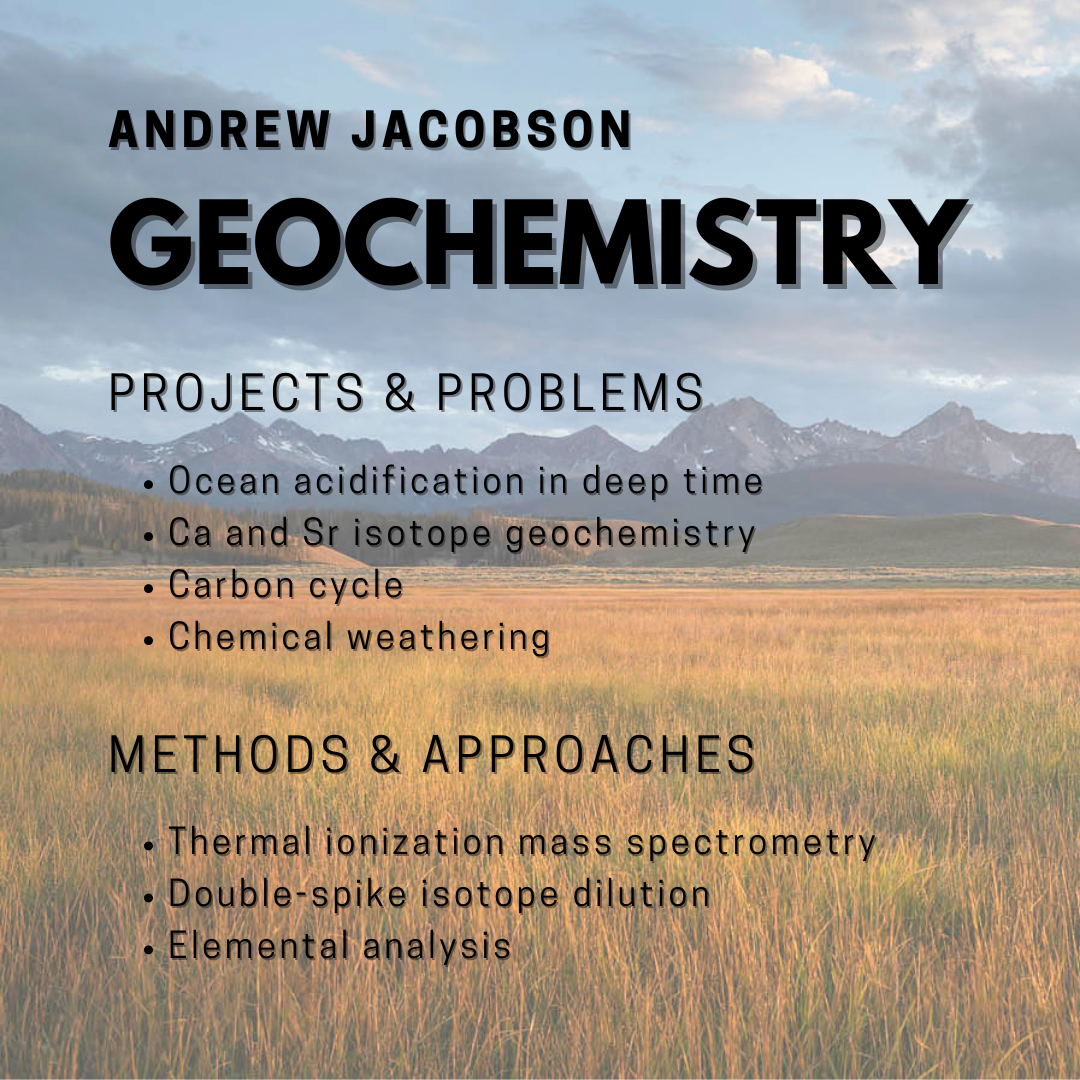Andrew Jacobson
Professor, Director of Graduate Studies, and Faculty Affiliate, Trienens Institute for Sustainability and Energy
M.S. Earth Sciences, Dartmouth College
B.A. Earth Sciences and Chemistry, University of California, Santa Cruz

- adj@earth.northwestern.edu
- Website
- 847-491-3132
- Tech F396/F398
Research
Andrew D. Jacobson specializes in radiogenic isotope and low-temperature aqueous geochemistry. His research combines fieldwork, laboratory experiments, and modeling to quantify chemical, physical, and biological phenomena that cycle elements and their isotopes at the Earth’s surface. Many activities use isotopes to probe the compositional evolution of the Earth, at timescales spanning the geological to modern-day. Other projects aim to elucidate the fundamental behavior of isotopes, including their distribution, transport, and possible fractionation within and between Earth’s biogeochemical reservoirs. A prime goal is to isotopically track the flow, transformation, and distribution of carbon during modern and ancient environmental change. Related efforts seek to improve radiogenic isotope measurements by thermal ionization mass spectrometry (TIMS). Researchers in the Jacobson group have conducted sampling campaigns in locations throughout the world, including the New Zealand Southern Alps, the North Slope of Alaska, the Canadian Archipelago, the Yucatan Peninsula, Greenland, and Iceland. Others have sailed on cruises directed by the International Ocean Discovery Program. Jacobson’s clean laboratory currently emphasizes the high-precision analysis of stable calcium (Ca) and strontium (Sr) isotope abundance variations by TIMS. Lab members apply these measurements to diverse problems ranging from paleoclimate reconstructions to basalt weathering. Jacobson’s research has direct implications for emerging technologies designed to mitigate the anthropogenic climate crisis, including ocean alkalinity enhancement, enhanced weathering, and carbon capture sequestration.
Teaching
EARTH 201: Earth Systems Revealed (Introductory Geology)
EARTH 310: Aqueous Geochemistry
EARTH 313: Radiogenic Isotope Geochemistry
Selected Publications
Nelson C., Jacobson A. D., and Weisenberger T. (2022) Controls on riverine calcium isotope ratios during basalt weathering in the Skagafjörður watershed, Iceland. Geochimica et Cosmochimica Acta, 333, 216-241.
Nelson C., Jacobson A. D., Kitch G. D., and Weisenberger T. B. (2021) Large calcium isotope fractionations by zeolite minerals from Iceland. Communications Earth & Environment. DOI: 10.1038/s43247-021-00274-9.
Kitch G. D., Jacobson A. D., Hurtgen M. T., Sageman B. B., Harper D. T., and Zachos J. C. (2021) Calcium isotope composition of Morozovella Velascoensis over the Late Paleocene-Early Eocene. Geology, 49, 723-727.
Wang J., Jacobson A. D., Sageman B. B., and Hurtgen M. T. (2021) Stable Ca and Sr isotopes support volcanically-triggered biocalcification crisis during Oceanic Anoxic Event 1a. Geology, 49, 515-519.
Linzmeier B. J., Jacobson A. D., Sageman B. B., Hurtgen M. T., Ankney M. E., Petersen S. V., Tobin T. S., Kitch G. D., and Wang J. (2020) Calcium isotope evidence for environmental variability before and across the Cretaceous-Paleogene mass extinction. Geology, 38, 34-38.
Wang J., Jacobson A. D., Zhang H., Ramezani J., Sageman B. B., Hurtgen M. T., Bowring S. A., and Shen S-Z. (2019) Coupled δ44/40Ca, δ88/86Sr, and 87Sr/86Sr geochemistry across the end-Permian mass extinction event. Geochimica et Cosmochimica Acta, 262, 143-165.

